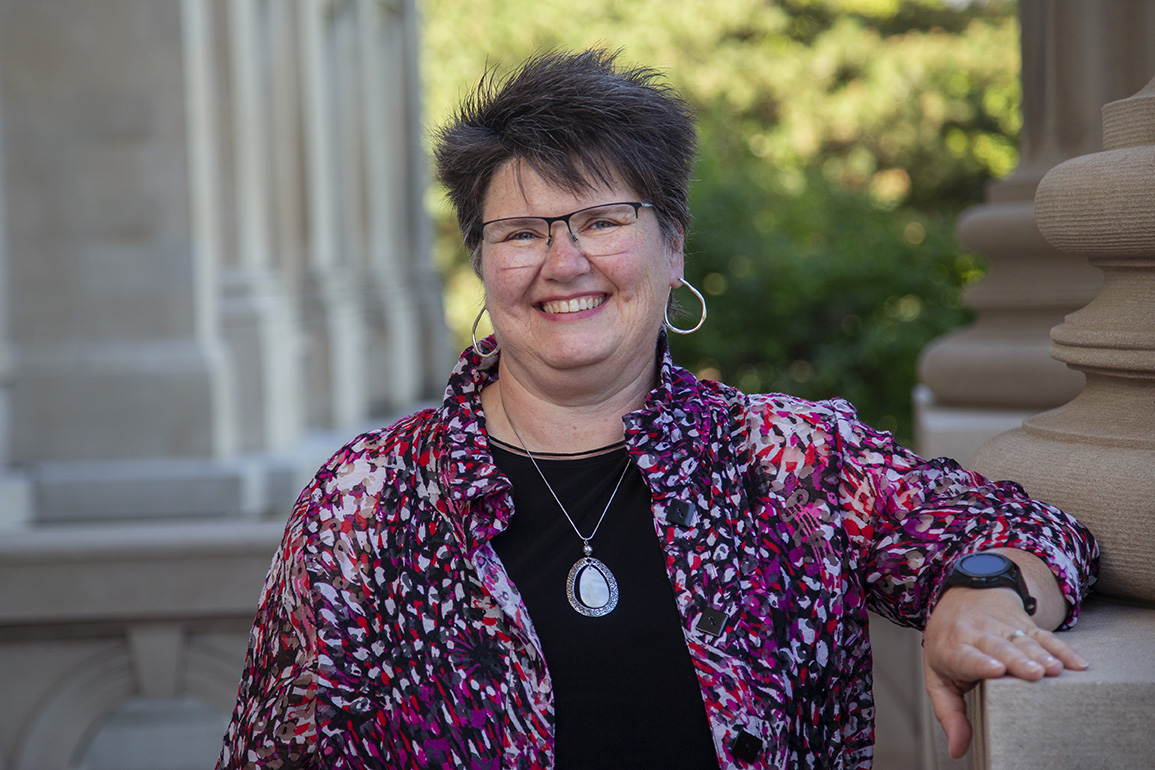For alum Carolann Jensen, all roads lead to Iowa State


When Carolann Jensen left Iowa State’s campus in December 1986 with a bachelor’s degree in public service and administration in agriculture (now agriculture and society), she had no idea where her career path would lead. Now, more than three decades later, she has found her way back to Iowa State and she couldn’t be happier.
Jensen became Iowa State’s state relations officer (SRO) in August 2019. As an SRO, Jensen’s work primarily focuses on educating state legislators about issues that impact the regent universities. She reports to the state Board of Regents, though her primary assignment is Iowa State. Iowa and UNI also have SROs.
“The Board of Regents hires us and then we’re basically loaned out to the institutions,” Jensen said. “We become the experts but we still represent the board and all three institutions.”
She, like the other SROs, tend to specialize in certain topics. Jensen’s focus is agriculture since she has access to a plethora of agricultural experts at Iowa State. So, when a new legislative bill related to agriculture or some other relevant topic arises in the statehouse, Jensen initiates conversations with legislators, detailing the bill’s impact on Iowa State and the other institutions.
“We have lots of discussions with legislators, making sure they understand what we do, how we’re impacted by legislation, telling our story to the legislators and other governmental officials on the state level,” she said.
Jensen came to Iowa State after more than 30 years’ experience working for state government. She worked eight years at the Iowa Finance Authority. Prior to that, she spent 24 years as a senior research analyst in the Iowa Senate.
Working from home … for now
Like most individuals, Jensen’s work at the statehouse has been impacted by the coronavirus pandemic. She, too, is working from home, but she continues to communicate Iowa State’s position on critical issues to legislators.
“Communicating the steps Iowa State has taken to confront the virus is my number one priority — whether that is relaying information regarding the state of the ag economy from a study by CARD, or the efforts of dining services to deliver food to food banks. I want people to know the extraordinary steps campus is taking to help Iowans.”
Always Iowa State
Growing up on a cattle farm near Plainfield, Iowa, there was never any doubt that Jensen would someday attend college at Iowa State. She recalls that even as a 4-year-old, the university called to her.
“I was always going to be a Cyclone. All my siblings went to private schools but the ‘cow college’ really got me because we raised cattle and I showed cattle,” Jensen said. “It wavered in high school a little bit because I got offers to play sports at smaller schools. But I always just wanted to come to Iowa State.”
So many options
But choosing a major proved more challenging. Initially, Jensen wanted to become a veterinarian.
“I quickly learned that I wasn’t dedicated enough to the hard sciences to become a veterinarian. But animal science wasn’t a draw for me either,” she said.
Then she turned to economics.
“I toyed with economics, but it didn’t fill a need,” Jensen said.
After more investigation, she stumbled upon a major called public service and administration in agriculture, which today is called agriculture and society. It was the fit was she was looking for.
“Government was clearly an interest for me. My family has been involved with politics since I was very young, so I understood that part,” she said. “I was amazed with the sociology part of the classes — it just clicked.”
Jensen connected with the interdisciplinary elements of the agriculture and society major, and she appreciated how it would allow her to affect change in the ag industry.
“People think they have a great idea and they think everyone else should understand that it’s a great idea. But there’s a process and a way to get your message across in a scientific and systematic way to get people to adopt your message or to change,” she said. “The agriculture and society major gives you a good basis to figure out how to do social change or institutional change in ag.”
As the agriculture industry continues to expand and grow globally, change is inevitable. Jensen believes students with agriculture and society majors will be well prepared to tackle these future changes.
“Things change quickly and you have to be able to adapt. I think this major, regardless of what your area of expertise becomes later, helps you adapt to changes,” Jensen said. “We’re getting influenced not just by the United States but globally, and if you can adopt to change quickly and understand where you fit in the change, you’ll be more suited for lots of jobs.”